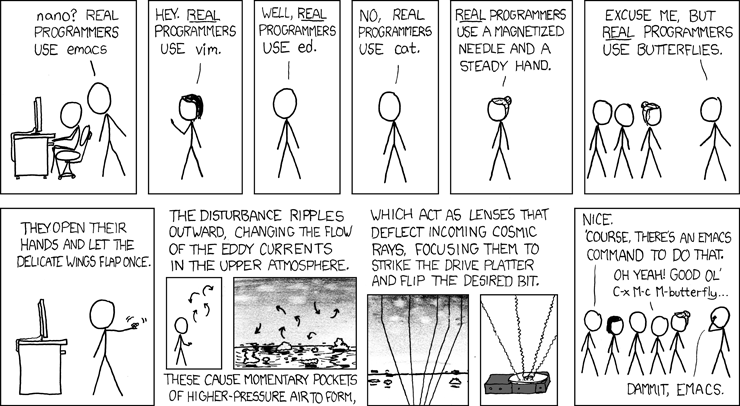Switching from Vim to Emacs
Last month I switched to Emacs after after 7 years of using Vim. I tried Emacs for the first time on a colleague's recommendation and after a month of using it I won't be going back.
Vim isn't removed from my workflow. For quick changes of single files and for modifying files if I'm already on a server, vim will be my go-to editor. For everything else, emacs has taken over.
It took a while to get emacs configured in a way that I liked, able to provide all of my favourite features of vim and then many more features on top of that. I did a fair amount of customisation (I believe all emacs users do this) as the out of the box user experience is truly abysmal. The defaults for simple things such as scrolling the page were crazy. The key combinations made no sense at all. I had to use my text editor to debug my text editor. Then I gave in and tried out evil-mode, which provides vim-style keybindings for emacs. If you're used to vim this is fantastic. I don't need to learn a whole new set of commands for editing. Pretty much everything I used in vim works the same way on emacs. I have almost the whole set of vim features I used and then a whole host of things I could never do before. I said that I haven't removed vim from my workflow completely. I still prefer using vim for quick edits and for working on remote machines (but, ofcourse emacs can edit remote files, even SSHing through multiple boxes to get there). By using evil-mode I don't lose the vim skills that I'd be using editing those files.
For most of my configuration I trawled the internet for peoples' .emacs files, tested each setting and imported the ones
I liked. For the rest I searched for answers online or in the in-built help system when I found something I didn't
like. Sometimes this means using other modes (essentially libraries providing functionality), sometimes it means using
different functions instead of the built in ones. Suddenly you realise that everything is configurable.
Don't like typing 'yes' or 'no' at confirmation prompts? Change the function that gets called when emacs needs to ask for a yes or no response.
(defalias 'yes-or-no-p 'y-or-n-p)
Want to see more information about files in a directory such as human-readable sizes? Configure the ls switches used to
show information about files on the filesystem:
(setq dired-listing-switches "-alh")
Want to automatically enable the spell checker for certain file types? Want it to check spelling as you type, continuously? Want to be able to save words to a personal dictionary?
(add-hook 'org-mode-hook (lambda () (flyspell-mode)))
Want that spell checker to only run on comments and strings when you're editing code? Use the programming version of the spell checker:
(add-hook 'c++-mode-hook (lambda () (flyspell-prog-mode)))
Want emacs to run the a Ruby syntax checker and linter as you type? Install rubocop and run flycheck:
(flycheck-mode)
It's all there and it's all configurable. Once you experience configuration this way you see how much more powerful it is using a programming language to perform configuration rather than listing key-value pairs. I consider myself pragmatic rather than religious about text editors. I wouldn't be using a tool if I didn't think it was the best one for the job. I spent a long time hearing emacs fans raving about what it could do but I needed to spend the time actually trying it out for myself before I understood why they were so zealous.
And then I discovered Org mode. Org mode is astonishing. I can track every issue I'm working on, support tickets I have
in play, thoughts about features that haven't made it to JIRA yet, store source code (highlighted in the correct
language's syntax highlighter), execute bash scripts from inside the text file, run MySQL queries and see the results
formatted in a table, even edit spreadsheets with actual cell and column formulae. I got emacs to export org-mode files
that Jekyll can use so I can write blog posts in org-mode. I used org-babel-load to store my emacs configuration in a
well-documented org-mode file, which emacs then publishes alongside my blog posts in an HTML file This means that my
configuration and the documentation for my configuration are the same file. There's a huge amount of features in
org-mode and it's definitely worth a separate post. My goal here is just to introduce some of the things that make my
life easier every single day.
It's only now that I begin to really understand the jokes about people who use emacs as their operating system. Once you can do everything in one place, why would you leave it?
